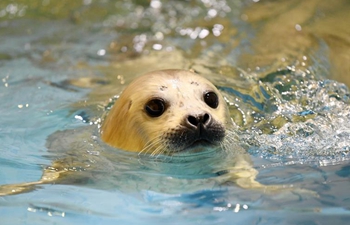WASHINGTON, Feb. 18 (Xinhua) -- An international team of scientists have decoded the entire genome of white shark and identified their superior cancer-protective abilities.
The study published on Monday in the the journal Proceedings of the National Academy of Sciences showed that a plethora of genetic changes might be behind the evolutionary success of large-bodied and long-lived sharks.
The researchers found that the massive vertebrate's molecular adaptation in numerous genes helped maintain the genome stability and counteract the accumulation of damage to a species' DNA, thereby preserving the integrity of the genome.
The opposite phenomenon called genome instability, which results from accumulated DNA damage, is well known to expose humans to numerous cancers and age-related diseases, according to the study.
"Not only were there a surprisingly high number of genome stability genes that contained these adaptive changes, but there was also an enrichment of several of these genes, highlighting the importance of this genetic fine-tuning in the white shark," said Mahmood Shivji with Nova Southeastern University, who led the study.
Previously, scientists supposed that the risk of developing cancer should increase with both the number of cells (large bodies) and an organism's lifespan. The white shark has a huge size of genome, one-and-a-half times the size the the human genome.
But contrary to the expectation, the new study found that very large-bodied animals did not get cancer more often than humans.
The study showed that the white shark genome contained a very high number of "jumping genes" or transposons, which could represent a strong selective agent for the evolution of efficient DNA repair mechanisms.
Shivji's group also found evolutionary adaptations were linked to the white shark's rapid wound healing ability.
"Genome instability is a very important issue in many serious human diseases. Now we find that nature has developed clever strategies to maintain the stability of genomes in these large-bodied, long-lived sharks," said Shivji.
Shivji said the findings might be useful to fight cancer and age-related diseases, and improve wound healing treatments in humans.

















